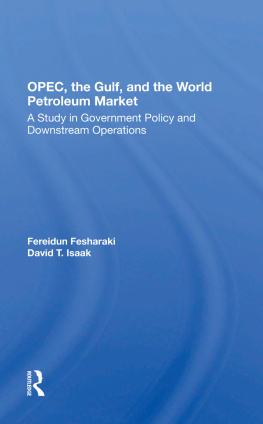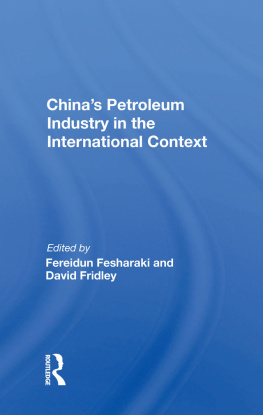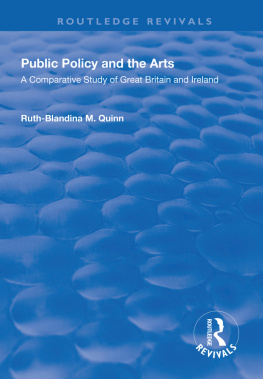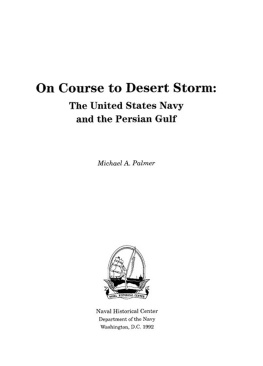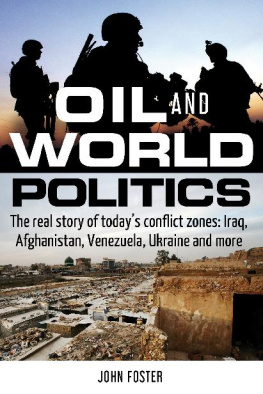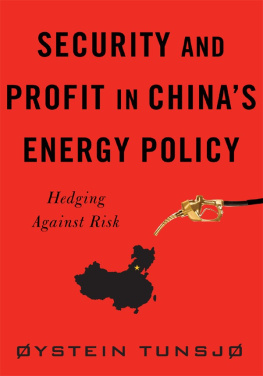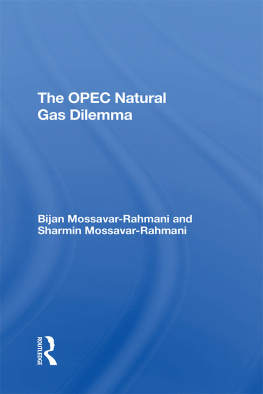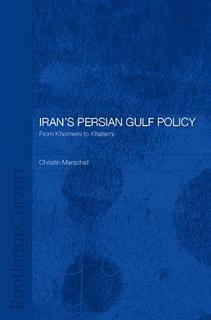OPEC, the Gulf, and the World Petroleum Market
Also of Interest
The New Arab Social Order: A Study of the Social Impact of Oil Wealth, Saad Eddin Ibrahim
OPEC: Twenty Years and Beyond, edited by Ragaei W. El Mallakh
Food, Development, and Politics in the Middle East, Marvin G. Weinbaum
The United Arab Emirates: Unity in Fragmentation, Ali Mohammed Khalifa
Libya: The Experience of Oil, J. A. Allan
Economic Growth and Development in Jordan, Michael P. Mazur
South Yemen: A Marxist Republic in Arabia, Robert W. Stookey
Syria: Modern State in an Ancient Land, John F. Devlin
Jordan: Crossroads of Middle Eastern Events, Peter Gubser
The Republic of Lebanon: Nation in Jeopardy, David Gordon
OPEC, the Gulf, and the World Petroleum Market: A Study in Government Policy and Downstream Operations
Fereidun Fesharaki and David T. Isaak
OPEC's dominant position as supplier of crude to the world oil market is well known. Recently, however, many of the OPEC nations, particularly those on the Gulf, have begun a large-scale move into hydrocarbon industries formerly controlled by the major oil companies. This book provides a detailed look at the OPEC nations' changing roles in the world oil market as they expand their participation in "downstream" activities.
The authors begin with a detailed survey of world oil resources and an overview of the production capabilities and policies of major oil exporters, then examine the current refinery overcapacity crisis in the developed world, outline the refinery construction plans of the OPEC nations and the refinery scrapping problem in the industrialized world, and employ simulation tools to estimate the future output mix of refineries in key OPEC nations. A discussion of the comparative economics of refineries in the Gulf and in Europe is also included.
Turning to the tanker industry, the authors project future oil export patterns and tanker demand in light of changing import/ export needs and OPEC's participation in oil and refined products transport. Subsequent chapters describe OPEC's ventures into petrochemical manufacturing and natural gas processing. The book concludes with a chapter on the future of OPEC, in which the authors examine OPEC's changing power structure, the influence of non-OPEC oil production, possible future oil-pricing policies, and the opportunities and constraints that OPEC nations will meet as they expand their operations in the downstream oil industry.
Dr. Fereidun Fesharaki is a research associate and coordinator of the OPEC Downstream Project at the Resource Systems Institute (RSI) of the East-West Center. He is also affiliate professor of economics and geography at the University of Hawaii. In 1977-1978 Dr. Fesharaki served as energy adviser to the prime minister of Iran and was a member of the Iranian delegation to the OPEC Ministerial Conferences. David T. Isaak, a technical analyst specializing in computer simulation, is a research fellow at RSI and assistant coordinator of the Downstream Project.
OPEC, the Gulf, and the World Petroleum Market
A Study in Government Policy and Downstream Operations
Fereidun Fesharaki and
David T. Isaak
East-West Resource Systems Institute
with a Foreword by Harrison Brown
First published 1983 by Westview Press
Published 2019 by Routledge
52 Vanderbilt Avenue, New York, NY 10017
2 Park Square, Milton Park, Abingdon, Oxon OX14 4RN
Routledge is an imprint of the Taylor & Francis Group, an informa business
Copyright 1983 by Taylor & Francis
All rights reserved. No part of this book may be reprinted or reproduced or utilised in any form or by any electronic, mechanical, or other means, now known or hereafter invented, including photocopying and recording, or in any information storage or retrieval system, without permission in writing from the publishers.
Notice:
Product or corporate names may be trademarks or registered trademarks, and are used only for identification and explanation without intent to infringe.
Library of Congress Catalog Card Number 82-17496
ISBN 13: 978-0-367-28193-9 (hbk)
Perhaps only once in the history of a nation does fate deliver into the hands of a country's leaders the tools necessary to build a modern state.
This book is dedicated to the people of the Gulf in hopes that they will have the wisdom to set aside their differences and quarrels and seize this opportunity to join the ranks of the developed nations.
The sharp increases in oil prices in 1973/1974 and 1979/1980 brought about massive hardships for the economies of oil-importing nations and precipitated a chain of events that have, in less than a decade, transformed the ways in which the world perceives and uses energy. For both economic and security reasons, oil importers have tried to minimize oil imports and substitute other sources of energy for oil. The major decline in demand from 1980 to 1982 is an indication that apart from the world recession, other structural changes in the economics of the oil-importing nations have led to greater efficiency in oil use.
The electrical sector, which accounts for 25 to 40 percent of the consumption of primary commercial fuels, has been notable for its movement away from oil and toward major transition fuels, notably coal, natural gas, and uranium. The use of solar energy for space and water heating is spreading, as is the use of heat pumps. In the transportation sector, smaller and more efficient automobiles as well as movements toward mass transit will save oil. However, outside the electric power sector, a shift away from oil seems destined to take place only slowly. In short, despite the inroads on its use, oil will remain the major source of energy at least for the remainder of this century and possibly beyond.
Energy analysts often suffer from short memory spans. Today there are many who extrapolate the current oil glut and weak prices into the future and project a no-problem future for oil supplies and prices. Daily obituaries of OPEC are written by energy experts, politicians, and the press. Such diagnosis of the future is unwise if not misguided, because the writers of such articles lose sight of the fundamental problem of finite oil resources and the firm resolve of the oil exporters.
The major oil exporters, whether they are classified as OPEC or non-OPEC, have similar interests: maintaining higher prices for oil and enhancing their political and economic control of oil. Their actions and policies will continue to have a profound impact on the economic well-being and security of the oil-importing nations. Among the major oil producers, the troubled Mideast nations of the Gulf region remain the key to the future of the oil market.
As the oil market has gone through ups and downs, many structural changes have continued to take place. Among the most profound changes are the OPEC nations' policies in building hydrocarbon-processing facilities: refineries and petrochemical plants in their own countries. This OPEC downstream buildup raises many new and important questions on the issues of security of supply and economic/ political control of oil that must be taken into consideration in the formulation of national energy policies. Fereidun Fesharaki and David Isaak have written a book that provides a unique insight into the dynamics of the oil market and into OPEC policies, with particular reference to downstream activities.


